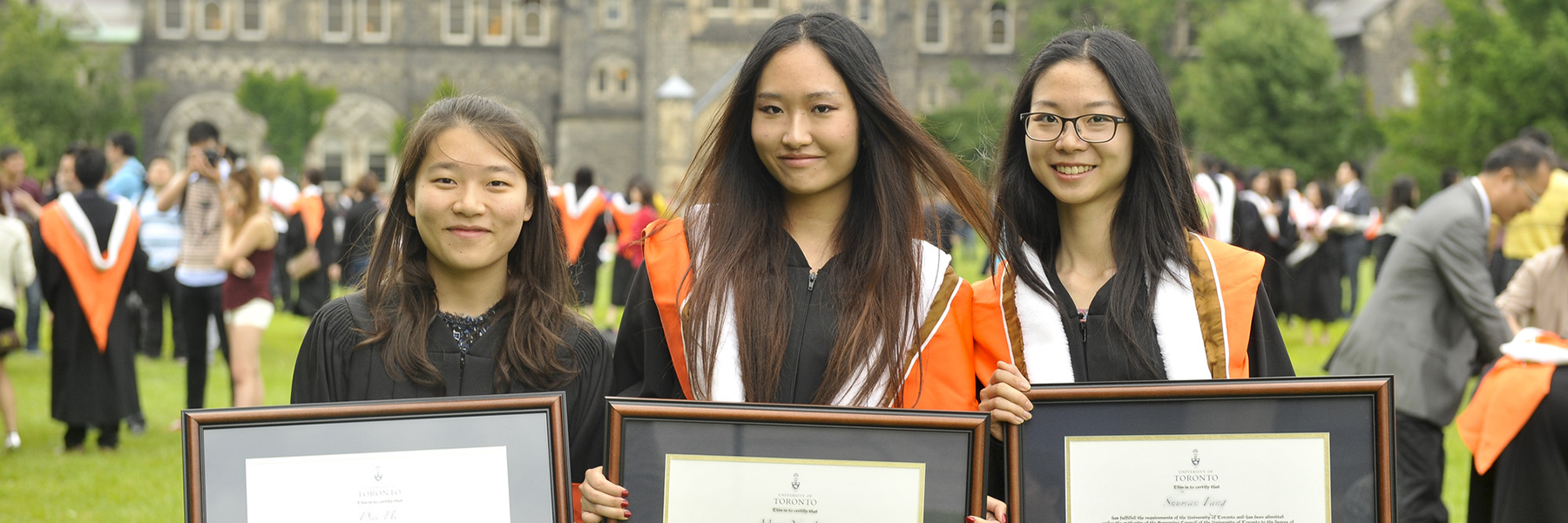Why Further Education?
You might be finishing up your undergraduate studies and are starting to consider what to do next. Many students will opt to look for work, and some will be considering the possibility of further education at university or college. Continuing on with your studies can be an inviting option for so many reasons: to pursue a subject you’re passionate about, gain new skills, improve your self-confidence, and gain networking and communication opportunities!
What is further education?
We’re referring to college and university programs that require partial or full completion of a degree before you join them.
Graduate and Professional School
Master’s Degrees
The next level of university education following a bachelor’s degree is a master’s degree. They are normally one to two years long, and can be course-based or thesis/research-based. There are three broad types of master's degrees:
- Professional programs – these programs are directed to a specific profession, for example, a Master of Science degree in Physiotherapy, or a Master of Business Administration.
- Terminal programs – these master’s degrees are completed before and separately from a doctoral program.
- Non-terminal programs – these master’s programs lead directly into a doctoral program, for example, the Counselling and Clinical Psychology program offered at UTSC. These programs are more rare than terminal programs.
Second-Entry Degrees
These are programs that normally require completion of a bachelor’s degree (though sometimes they may require only partial completion of an undergraduate degree) and that lead to professional designations. Examples are medical school, dental school, second-entry nursing (BScN), and law school.
College
Colleges offer certificates (normally 1 year in length), fast-track diplomas (normally 2 to 3 years in length shortened to 1-2 years for university graduates), and graduate certificates (normally 8 months to 1 year in length). Visit www.ontariocolleges.ca.
Graduate certificates require the completion of an undergraduate degree or college diploma for admission, and thus are very attractive to university grads, as they build upon knowledge and experience gained through your bachelor’s degree.
| Graduate School | Professional School | College | |
|---|---|---|---|
| Level | Master's degree (then Doctorate) | Second-Entry Bachelor's or Master's degree (depends on field of study) | Certificate, Fast-Track Diploma, Graduate Certificate |
| What is it? | Intensive study of a particular area/subject, often involving a strong research focus | Study leading to a professional designation such as teacher, pharmacist or social worker | Training in skills-focused areas such as addictions counselling or marketing |
| Duration? | 1-2 years (or more) | Varies, generally 2 years or more | 1-2 years |
| Admission Requirements | Generally a strong GPA, research experience, references | Strong GPA, relevant experience, extra-curricular involvement, references | University degree, demonstrated interest in particular areas |
Reasons to consider further education
Reflect on the reasons for considering further study. It is a decision that only you can make, and each person will make the decision for their own reasons.
Are you curious about further study? You might think about the following reasons to pursue further education:
- Your occupational goal requires a postgraduate qualification, for example, to become a counsellor or a business professional.
- You have a passion for a particular subject area. For example, you might be especially interested in studying Germanic languages and literature. Do some research online re if/how it may relate to your career goals. Speak to a career advisor at the AA&CC if you’re unsure.
- You want to enhance your employability by adding an asset. For example, a student interested in human resources or corporate communications could pursue a post-graduate college certificate. You may want to look for programs that have a co-op or internship component too!
- To make a change in direction. You may have found that the subject of your undergraduate degree was not a great fit for you, and going into a different field of study can allow you to make a switch. For example, if you studied business but now find yourself more interested in the field of health, you could look at graduate degrees or post-graduate certificates that could take you in this direction.
There are also reasons to put further study on hold, if only temporarily. If you find yourself relating to any of the following scenarios, you may want to pause and reflect:
- You’re not sure what else to do. Some people may choose to continue or go back to school with a hope that it will somehow resolve career confusion. In fact, it may actually lead to less clarity. Engaging in self-reflection and gaining experience is a better way to clear up career confusion. Speak to a career advisor at the AA&CC.
- You’re feeling pressure from family members or peers to further your education. It’s possible that further education may not be necessary for your field. It’s a big investment of resources, so it is important to do your research first.
- You’ve been looking for a job for several months and haven’t had any luck yet. It takes time, patience, and perseverance to find work after graduation. Don’t give up too quickly! You may invest in further education and find yourself stuck on the job search again. Seek guidance from a career advisor at the AA&CC if you would like some coaching on your job search.
Graduate & Professional School Showcase
Attend the Graduate & Professional School Showcase that takes place in September each year. It features presentations from universities and colleges across Ontario and beyond! If you missed the Showcase, the recorded presentations are available for viewing on CLNx until December of each year.
Need more help?
Uncertain if further education is right for you? Not sure what program best suits your needs and interests? Make an appointment with a career advisor at the AA&CC!
